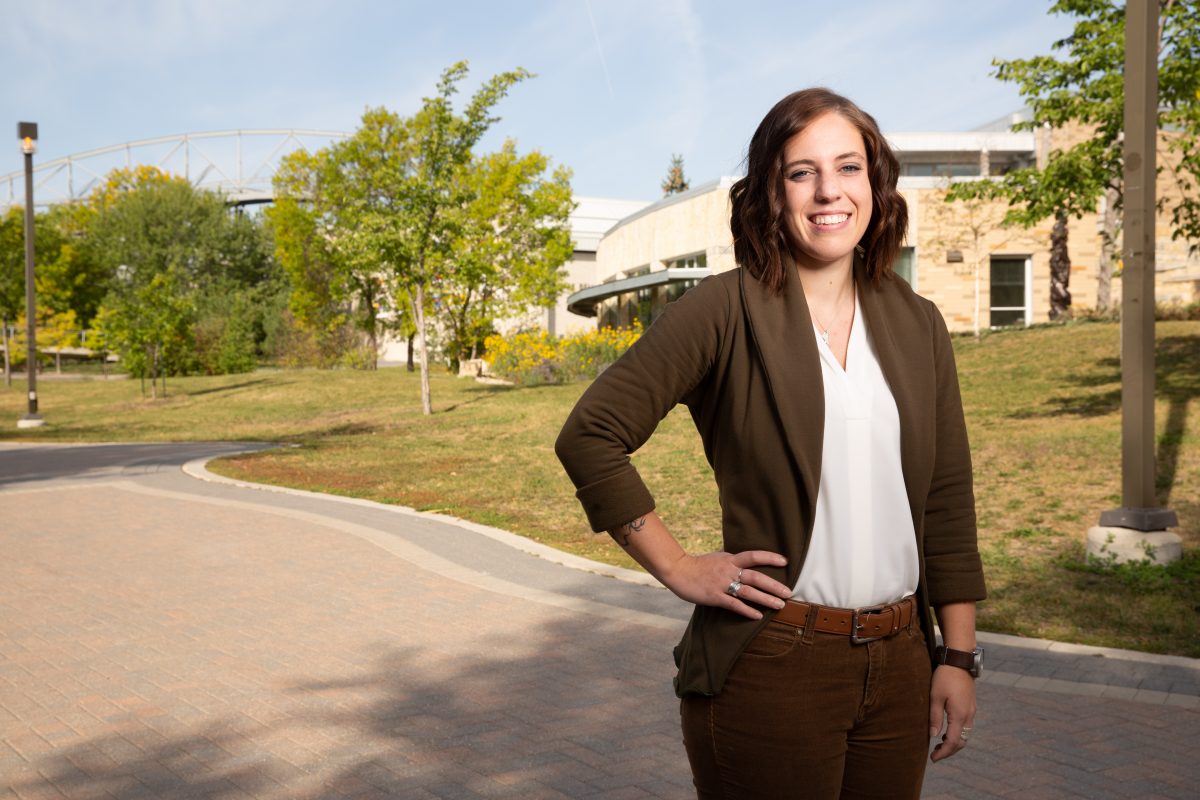
Taylor Morriseau, a PhD student in pharmacology and therapeutics and a recently named Vanier Scholar
New Vanier scholar explores how traditional Oji-Cree diet can affect diabetes rates
For hundreds of years the gene did no harm. Like a feather in a stuffed suitcase, it was carried about without any notice. Then things changed, and the gene wrought sickness on a remarkably specific group of children.
The alarm was sounded in 1985 by pediatrician Heather Dean from the University of Manitoba. She noticed that type 2 diabetes afflicted Oji-Cree children living in northwestern Manitoba and northeastern Ontario. People didn’t believe her. For starters, type 2 diabetes was an adult’s disease.
Given the localization and pervasiveness of this disease, researchers focused in and found a unique genetic variant (known as HNF-1αG319S) was a major culprit. Indeed, this gene variant is the strongest predictor of type 2 diabetes currently known to science. It has not been found in any other population.
We still don’t know how it works to promote diabetes but Taylor Morriseau, a PhD student in pharmacology and therapeutics and a recently named Vanier Scholar, aims to solve this.
It remains unclear why so many young lives are being affected now, when incidences were incredibly low just two generations ago. It’s believed the answer lies amidst Canada’s complex colonial history, a legacy of which is a shift away from land-based food strategies towards Western-based diets. Thus, Morriseau wants to see how a traditional Oji-Cree diet could quell the gene.
“Food security is a huge issue in northern communities and I’m hopeful to use this research to support community-led efforts to access culturally-safe, nutritional food,” Morriseau says. “I’m currently looking at how this genetic variant effects the onset of diabetes and as I now hold the Vanier, I want to look at how diet can be the influencer and can protect someone from developing type 2 diabetes. My hope is to move into how traditional diets can attenuate the risk.”
Genes rarely work alone (our eye colour, for instance, is determined by an alliance of many genes). And single, problematic genes are currently difficult to target with medical interventions, so when we want to tweak a gene’s effects, changing the body’s environment is usually the sensible approach because as geneticists point out, genes load the guns but the environment pulls the triggers. For this Oji-Cree population, it’s reckoned that a shift away from their traditional diet fired the gun.
Using her Vanier funding, Morriseau, herself a Cree woman from Peguis First Nations in Winnipeg, will investigate the gene through the first mouse model bred with the HNF-1aG319S gene variant.
Working with her advisors Vernon Dolinsky and Christine Doucette (both working out of the Children’s Hospital Research Institute of Manitoba), one of her experiments will modify experimental diets to mirror nutrient intakes of historical Oji-Cree diets —high animal protein and fat, low carbohydrate—to see what effects it has on the endocrine system.
Morriseau became interested in this field and basic research after completing a co-op placement in pharmacology as an undergrad student.
“I grew up wanting to be a marine biologist but that sucks for a prairie girl,” she says with a laugh. “I love doing basic science research, and although the process may feel slow to someone looking-in, there is incredible value in this work. It has that potential to help not one or two people, but people across the world. There’s nothing like it.”
Morriseau is also driven to do her research by a sense of duty.
“What I have learned in community—and not in research but in ceremony—is that we all carry unique gifts and responsibilities,” she says. “I just had to find a way to pursue my passion, which is research, and merge that with my responsibility to uplift the next generation. This is one outlet where I can empower young Indigenous lives, who should have the opportunity to leave their own legacies unburdened by disease.”
Vanier Scholarships recognize students who demonstrate leadership skills and a high standard of scholarly achievement. These awards, considered the Canadian equivalent of the United Kingdom’s Rhodes Scholarships, help recruit and keep in Canada’s top doctoral students. Each recipient will receive $150,000 over three years towards his or her research.
In ten years, 26 U of M students have received Vanier scholarships, including Morriseau and fellow 2018 recipient Iloradanon Efimoff.
“Taylor and Iloradanon are exceptionally bright and dedicated students who also exhibit a great hallmark of outstanding researchers: creativity. They design clever experiments that can tease out facts of nature, and the impact of this is hard to know right now because the payoffs will resonate for generations,” said Todd Mondor, Vice-Provost, Graduate Education and Dean, Faculty of Graduate Studies, at the University of Manitoba. “We are very proud of them.”
ABOUT VANIER SCHOLARSHIPS
The scholarships are administered by Canada’s three federal granting agencies: the Canadian Institutes of Health Research; the Natural Sciences and Engineering Research Council of Canada; and the Social Sciences and Humanities Research Council.
The Vanier program honours distinguished Canadian soldier and diplomat Major-General the Right Honourable Georges Philias Vanier (1888-1967), who served as Governor General of Canada from 1959 to 1967.
Research at the University of Manitoba is partially supported by funding from the Government of Canada Research Support Fund.







Very pleased with the research and search for the answer to Diabetes – a culprit that has taken many lives and continues to shorten life expectancy of our people… Food security has been taken from our people from the time of colonialism and removal of our traditional territory.. Projects like ‘back to the land’ – community gardens – traditional hunts – and of course, research by our own people is very important.. The Best to these two young people who are involved with Research and the Vanier recognition…